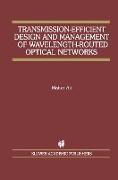Transmission-Efficient Design and Management of Wavelength-Routed Optical Networks
BücherAngebote / Angebote:
Optical networks, employing Wavelength-Division Multiplexing (WDM) and wavelength routing, are believed to be the answer for the explosion in IP traffic and the emergence of real-time multimedia applications. These networks offer quantum leaps in transmission capacity as well as eliminate the electronic bottleneck in existing metropolitan and backbone networks. During the last decade, we witnessed a tremendous growth in the theoretical and experimental studies focusing on the cost-effective deployment of wavelength routed networks. The majority of these studies, however, assumed ideal behavior of optical devices. In this book, we argue that for the successful deployment of optical networks, design algorithms and network protocols must be extended to accommodate the non-ideal behavior of optical devices. These extensions should not only focus on maintaining acceptable signal quality (e.g., 12 maintaining BER above 10- ), but should also motivate the development of optimization algorithms and signaling protocols which take transmission impairments into consideration. In addition, the design of enabling technologies, such as optical cross-connects, should be transmission-efficient. This book is a comprehensive treatment of the impact of transmission impairments on the design and management of wavelength-routed networks. We start with transparent networks, focusing on power implications such as cross-connect design, device allocation problems, and management issues. In this all-optical model, we propose a design space based on reduction in overall cost and ease of network management. This design concept, motivates various switch architectures and different optimization problems.
Folgt in ca. 15 Arbeitstagen
